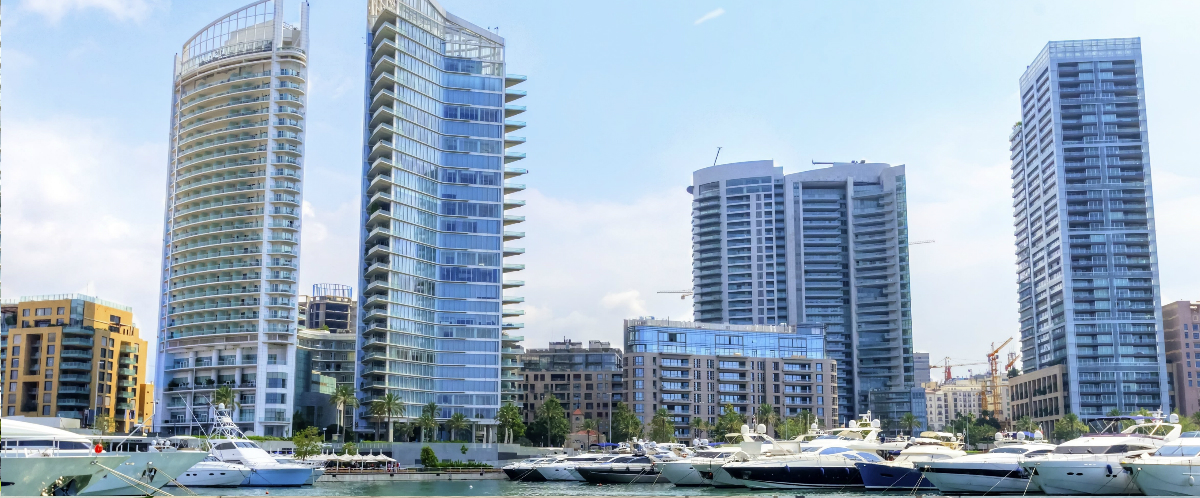
- 17 Nov-2022
The Real State of Real Estate - Ch. 1
Much has been said and made about the real estate sector in Lebanon over the past few years.
“Prices are on the decline!”
“It’s going to crash, wait for it!”
“It will only get cheaper.”
While these statements may seem well thought of, and maybe even to some, they may sound precise, I assure you that is not the case.
Real estate in Lebanon is at a very interesting time right now. It is a time that we as Lebanese have not yet encountered. You have to remember that property in Lebanon did not boom until 2008. So us as Lebanese are not familiar with the high and lows of a real estate market, or what is referred to as a Real Estate cycle. We do not know how to anticipate the value fluctuating, the pedigree in which some projects are developed and put up for sale, we are not keen to the practices of the industry. Some might even consider the practice of investing in real estate as simple as “buying a house”. Rest assured it is much more meaningful than that.
Brief History Lesson
In 2008, the global financial crisis was fresh in many markets, and U.S. was in middle of its subprime mortgage crisis. Real estate in London had begun to depreciate drastically, and companies on the Dow Jones bowed out of the race one after another. However, it was Lebanon, in the midst of all the worlds chaos, where an unprecedented economic boom occurred. If the 1960’s where Lebanon’s Golden Years, the late 2000’s were its Dollar ones. If you had bought a house in 2007 for $70,000, that very same house would be worth $182,000 in 2011. That’s an ROI of 40% year on year. That’s a pretty good investment.
The Now and How
Fast forward to 2017, the market has slowed drastically, there is an abundance of people living in the capital Beirut, not to mention an excess of 1.5 million refugees in a country whose infrastructure is not equipped to handle a population of more than 6 million. The country is at a stalemate. The region is at war, and the rest of the world isn’t doing so well either. Oil is down, currencies around the globe are depreciating, and approval ratings in Governments aren’t as high as some would like. The whole world is going through a transitional period. And this isn’t 2008, Lebanon is not booming as it once did, but it is not doing as bad as the general narrative claims, given the circumstances it has had to deal with. Lebanon, as a society, has its fair share of “naysayers”. For those of you who do not know what that word means, they are the ‘chicken little’s’ of the world. The “sky is falling”, pessimistic out look on life. You can’t blame them, but at the same time you can’t really listen to what they have to say because rarely do they approach any situation from an objective point of view.
“The country is so bad, no water, no electricity, all trash!”
“You can’t find a job, the house prices are so high, all corruption no government whatsoever!”
I understand where this narrative stems from and how it becomes tempting. The easiest thing one can do in life is to scapegoat, it’s as easy as lying. But take a moment and do the following. Put Lebanon in a timeframe of the last 7 years., roughly around the outbreak of violence in the Middle East. Once you’ve done that, analyze where Lebanon once was, and where it now is. Let’s readdress all political, social, and economical events that have transpired in that time frame.
So in the past seven years this is the events and realities that have transpired in Lebanon.
First and most glaring, It has went from one of the most dangerous countries in the region, to the safest country in the region. Its ISF, Military, and General security have all gotten bigger, better, smarter, stronger, and much better trained and equipped. The proof being the numerous terrorist attacks they have stopped in recent years, along with the raids and busts on terrorist cells, and the Armies ability to hold ground at the border in Arsal. Lebanon has learned to defend itself from any threats, be it foreign or domestic. Countries in the Middle East, such as Iraq, Saudi Arabia, Iran, Yemen, not to mention Syria, face terrorist attacks and threats each day. Even European countries such as England, France, and Belgium all face daily threats and attacks. On the other hand, in the past year, Lebanon has worked itself out from the abyss of destruction it once was deeply stuck in, all while harboring an excess of 1.5 million Syrian refugees. That is mind blowing.
Another factor that has changed in the past 7 years would be our economy. Lebanon was a country that relied on two main economic sectors, Real Estate and Tourism. Anyone familiar with economics knows that is a plan for disaster. Relying on tourism for economic performance is very much like relying on your iPhone battery to last you through the day without charging. At some point it’s going to turn off, and when it does, you’re going to have to function without it. That is the harsh reality of the relationship between the Tourism Sector and the Lebanese economy.
As for real estate, like every major industry in any market in the world, it’s Cyclical, meaning it has its highs, and it and it has its lows, and as we will discuss in future posts, right now its at a low. So given the lack of performance in the countries main economic drivers, the economy has recessed, but never sunk into depression, mind you. But hopefully that won’t be the case for long. We have already realized that there is a lack of diversity in economic performance. In doing so, we’ve already begun to expand into other areas of productivity. Recently the Oil reserves of the coast have been a topic of conversation, and while it may be a rigorous process, if pursued, could open huge economic doors for the country. Oil equals investment almost always, foreign investment specifically. Another sector picking up speed is the tech sector in Lebanon. Many SME’s have ventured into app development and technological services. Recently labeled the “Silicon Valley” of the Middle East, Lebanon is working to stand out in this regard, with more and more investment being aimed towards the sector and its infrastructure (internet services and tech hubs).
Silicon Valley of the Middle East, reminds me of another lame name they gave Lebanon….
Another one of the currently most talked about developments in the country is its Banking Sector. Headed by Riad Salameh and his intuitive initiatives, the banking sector has bloomed, thrived, and blossomed in the past years under his tenure. Many naysayers in Lebanon dispel the responsibility of Governor of the Central Bank. Claiming political affiliation plays the role. But its our belief that this is the one role in all of Lebanon that is not, and can not, be politically affiliated, due it extreme sensitivity. The Governor must keep the Lebanese currency afloat i.e. RELEVANT. He/she must also make sure we have a good balance of reserves and currency being traded in the open market. As well as just recently, all in thanks to the new sanctions the US federal Government imposed on Lebanon because of the presence of Hezbollah in the country, the Governor must also make sure all Lebanese banks, foreign and domestic, abide by all the sanctions, while maintaining client privileges and practice non-discrimination. Other duties include investment initiatives, loan incentives, interest rates and etc. Riad Salameh has maintained the performance in the Banking sector for years, and has recently elevated to one of the top of its class in the Middle East. For those who argue his re-election I would say that in the midst of uncertainty we need certainty and under Riad Salameh I am pretty certain the banks would do fine, if not prosper.
We have the security and economy and the banking, now for a subject that’s dreads the most in Lebanon, Politics. Lebanese politicians are far from saints, and they are rarely ever credible. So when reading this, try to look at the bigger picture, rather than dissect it from its microelements. The government has come a long way. Fresh off a presidential vacuum that lasted two years, the batch of extended parliament members elected a president. And while not on consensus, it was on majority. Since then, the President, while he has not over achieved, he has not under achieved either. Recently also, the government approved a new election law, that will be administered in the next voting cycle. The election law has gathered its fair share of “naysayers” mentioned above, but as mentioned earlier, it’s easy to scapegoat. Try to look at the approval of this law as a step forward. It was, after all, the first of its kind in the last 9 years. Think about that. So even dating back to 2008, when the government was considered credible, they didn’t approve a vote law.
So why now? Because the Government realized that changes have to be made for the overall sustainability and security of the country and they went about the business of making these changes. They may not all be perfect, or even fair to the general public, but we will have time to readdress these issues at a later time.
Welcome to Smooth Move
A narrative is very interesting, it is what sets events into motion. Narrative is what fueled the speculation that led to the 1929 Great Depression to occur. Narrative is what allows lawyers to prove a point beyond reasonable doubt in a court of law. It is with narrative that many people go about their daily lives.
“Should I purchase this new dress today?”
“Should I put down my first payment for a car?”
It is depending on the narratives of your individual lives that the answers to these questions come about.
“Yes, I worked overtime this week, saved up and I deserve it!”
“No, I have mortgage payments I have to keep up and now is not the time.”
So choices should be made based on your narrative, not the narrative of others, and certainly not on the narrative of the naysayers that are out there. Whenever making a decision, you should do so by educating yourself, and knowing your options. This is why we will launch something that is unprecedented in Lebanese property websites and that is educating of prospective buyers and investors, and informing the public on the state of the country. Smooth Move will continue to post about the condition of the economy, as well the various economic sectors and any related topic. We will try our best to enlighten you on the current situation at hand and do so from a non-biased objective viewpoint. We will try and correct the narrative. With that being said, Lebanon now is slowly getting back up on its feet after withstanding the gruesome regional events that were thrown upon us. We are still learning how to adapt to the modern way of doing things. We are still learning how to distance ourselves from outside factors while focusing on the domestic issues.
In our next post we will go in depth about where the economy currently stands, how the general population views it, and how the naysayers have set the narrative and why it is time to change it.
